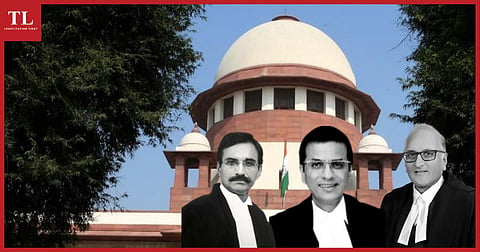

THE Supreme Court has termed the Central Government's policy of paid vaccinations by state governments and private hospitals for persons between 18-44 years as arbitrary and irrational.
"The policy of the Central Government for conducting free vaccination themselves for groups under the first two phases, and replacing it with paid vaccination by the State/UT Governments and private hospitals for the persons between 18-44 years is, prima facie, arbitrary and irrational", a bench consisting of Justices DY Chandrachud, L Nageswara Rao and Ravindra Bhat, said.
The court said the vaccination policy had been substantially changed for persons between 18-44 years of age.
Among other requirements, under the Centre's Liberalized Vaccination Policy digital registration and vaccination bookings through CoWin have been made mandatory and some within this age group have to pay for their vaccines. Besides, limited vaccines have been made available for this category to the states, union territories and private hospitals.
The court said reports indicate that persons between 18-44 years of age had not only been infected by COVID-19, but had also suffered from severe effects of the infection, including prolonged hospitalization and, in unfortunate cases, death.
The bench also directed the state government to confirm on affidavit whether they would provide vaccines free of cost to its population. If they had indeed decided as such, then, as a matter of principle, this policy must be filed in the court so that the population within their territories can be assured of their right to be vaccinated for free at a state vaccination centre.
It also directed the Centre to clarify how the 35000 crores earmarked in the Union budget for procuring vaccines have been spent so far and why they cannot be utilized for vaccinating persons aged 18-44 years.
The court also summoned all the documents and file notings on the Centre's vaccination policy.
It also directed the Centre to undertake a fresh review of its vaccination policy addressing the concerns raised. The court sought clarification from the government on the following aspects:
Besides, the court directed the Centre to furnish the following data-
The Court said it did not intend to second-guess the wisdom of the executive on policy matters, but the court would continue to exercise its jurisdiction to determine if it conforms to standards of reasonableness, militates against manifest arbitrariness and protects everybody's right to life.
"Our Constitution does not envisage courts to be silent spectators when constitutional rights of citizens are infringed by executive policies. Judicial review and soliciting constitutional justification for policies formulated by the executive is an essential function, which the courts are entrusted to perform", the Court said.